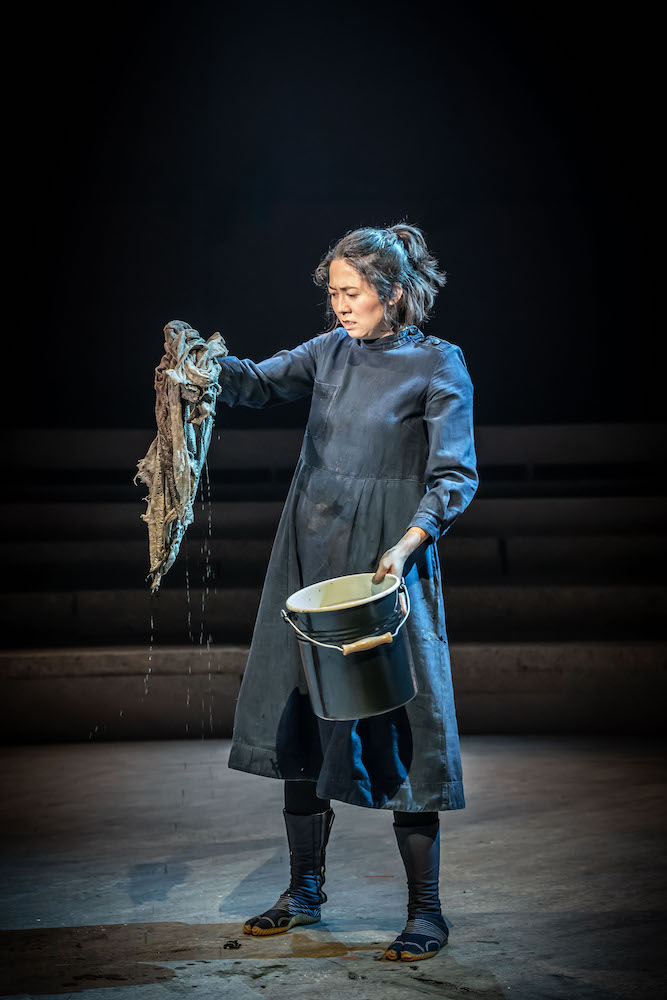Some plays are instantly forgettable, others leave a tender fold in the memory. I well remember seeing Zinnie Harris’s evocatively titled Further Than the Furthest Thing in 2000, and marveling at its strange beauty and linguistic flair. Now revived at the Young Vic, in a beautifully visual, if tonally uncertain, production by Jennifer Tang, one of the venue’s Genesis Fellows, this version confirms my initial impression of a haunting story told in a magical way. And its welcomely diverse cast is led by Jenna Russell and Cyril Nri.
Based on events that happened on Tristan da Cunha, an island in the South Atlantic whose 268 inhabitants were evacuated by the British government in 1961 after a volcanic eruption, the play dreamily recreates a lost world. Harris pictures a community that time has forgotten, a mixture of cultures, part Napoleonic, part Victorian and partly modern, whose language is a quirky but attractive version of English and whose isolation means the inhabitants are suspicious of strangers and unaware of modernity. This is no island paradise, but a place of grim poverty as well as strong bonds.
 The plot centres on a gnarled handful of characters: Mill (Jenna) is married to chaplain Bill (Nri) and wants to keep hold of Francis, her dead sister’s son who she has brought up, despite his desire to leave the island. After he returns from a trip to South Africa, he brings with him Mr Hansen, an industrialist who offers to modernise the island economy. At the same time, Francis is attracted to Rebecca, a young woman who is pregnant by another man. When the volcano erupts, the action switches to England, where the islanders have been evacuated. Mill becomes the leader of a campaign to return home, and a guilty secret in the island’s past is revealed.
The plot centres on a gnarled handful of characters: Mill (Jenna) is married to chaplain Bill (Nri) and wants to keep hold of Francis, her dead sister’s son who she has brought up, despite his desire to leave the island. After he returns from a trip to South Africa, he brings with him Mr Hansen, an industrialist who offers to modernise the island economy. At the same time, Francis is attracted to Rebecca, a young woman who is pregnant by another man. When the volcano erupts, the action switches to England, where the islanders have been evacuated. Mill becomes the leader of a campaign to return home, and a guilty secret in the island’s past is revealed.
The theme of how a community is created by a shared sense of place is beautifully portrayed in Harris’s writing. Not only has she created a distinct language and vocabulary for the islanders, but their easy-going sensibility is shown in contrast to Mr Hansen’s vision of industrial and urban modernity. His arrival both tempts them by its promise of wealth and offends them by its indifference to custom. In the second half, set in England, Hansen offers jobs to Francis, Bill, Mill and Rebecca, and – like a patrician Victorian factory owner – sorts out their accommodation problems. But this can’t cure their homesickness.
The play also explores the islanders’ different attitudes to their newfound English identity, often with a comic slant as, for example, Mill parodies the host nation’s manners in a tea-drinking scene. She becomes a stronger and more determined islander in exile, while Francis attempts to assimilate into English society, speaking a standard English and rejecting the individuals who once loved him. The mother country, meantime, cheats these exiles by pretending that their homeland has sunk beneath the waves, while using – it is suggested – the island as a base for atom bomb tests. Oh yes, this is a story about neo-imperialism as well as exiled community.
The sense of homesick migrants, who have different attitudes to their new situation (English housing, English factory jobs, English manners), comes across strongly, and resonates with the experience of other arrivals to these shores. There is both bewilderment, seen especially in Bill’s anguish at having to work regular shifts timed by the clock rather than the seasons, and bitterness about the refusal of the British government to allow the islanders to return. Likewise, they experience the racist condescension of the media, with Rebecca literally fighting back against an instructive and patronising news reporter.
Tang’s production is strong on visual images, but less sure when it comes to some of the early scenes, although most of the drama of the second half is powerfully delivered. On a revolving stage, designer Soutra Gilmour creates a simple staging, with the pick-and-mix costumes of the characters creating the necessary sense of strangeness. Impressive volcanic tremors are created by Ian William Galloway’s video work, with help from George Dennis’s sound, while a live vocalist, Shapla Salique, provides an otherworldly spirit of place.
Although Tang and the cast struggle sometimes to find the music in Harris’s text, every performer makes a memorable contribution. Russell’s Mill visibly grows in stature as she leads the islanders' campaign and her revelation of the community’s wartime secret is heart-rending. Although it’s hard to make sense of Bill being given a responsible job in England (a rare absurdism in the script), Nri conveys his character’s fortitude as well as his loss of identity. Rebecca, played by Kirsty Rider (pictured above), has an excruciating black-blood birth scene, Gerald Kyd’s Hansen delights with his magic tricks and Archie Madekwe’s Francis embodies the uncertainties of cultural assimilation. Despite some uncertain passages, this is an empathetic revival of a contemporary classic.















Add comment